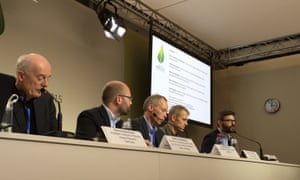Extract from The Guardian
Anticipation builds for COP21 to deliver a
groundbreaking deal as experts welcome draft statement to keep
warming to well below 2C
Scientists deliver a press conference on Friday 11
December at Paris climate talks. Photograph: Graham Readfearn
Saturday 12 December 2015 03.00 AEDT
There’s a cafe next door to the thronging media
centre at the UN global climate talks in Paris where the constant
clang of the door to the chill air outside can barely be heard above
the buzz.
Veteran climate scientist and biologist Professor
Lesley Hughes has taken a seat with me close by and is struggling to
hear herself think.
But the chaos and noise of the global climate
talks are not enough to drown out her feeling that a historic moment
could be only hours away.
Minutes earlier, scientists delivered a dose of
sobering reality to negotiators from a meeting room where journalists
took up every seat and then every square metre of floor space.
“We still have 24 hours to pull something
stronger together,” said Kevin Anderson, deputy director of the
Tyndall Centre for Climate Change Research in Manchester, England.
What was currently in the draft text of the new
Paris deal was, according to Anderson, “somewhere between dangerous
and deadly” for the most vulnerable nations in the world. Others
would disagree.
All the scientists here do agree that a new global
deal, now expected to be put up for agreement sometime on Saturday,
needed to match the scientific realities of keeping global warming to
well below 2C while aiming for 1.5C.
For that, the conclusions were simple. By the back
end of the century, or perhaps much earlier, global greenhouse gas
emissions needed to hit zero.
The deal, said the scientists, was a long way from
perfect, but most seemed optimistic that it was a strong basis for
improvement.
Australia’s Hughes, from Macquarie University,
has been in climate research since 1990.
As famous climate campaigner Bill McKibben hurries
through the clanging glass door, she is choosing an optimistic tone.
“Unless you are hopeful, then you may as well give up,” she says.
“The only hope for the planet is to stay hopeful.”
In 1994, Hughes was a co-author on a controversial
paper in Nature
that for the first time estimated how many species were at risk from
extinction from climate change. As many as a third of all species
could die out from climate change, the paper found.
She authored an influential paper in 2000 in the
journal Trends
in Ecology and Evolution that for the first time brought together
data from around the world to find that plants and animals were
already showing impacts from increased levels of greenhouse gases in
the atmosphere.
Hughes says that back in 1990 when she began
researching climate change impacts on ecosystems, terms like carbon
footprint had not even been invented.
“Back then climate change felt like a long way
off. It was an academic thing. I could never have envisaged being at
an international meeting with 40,000 delegates from 190 countries to
agree a global agreement. It was beyond imagining.”
Fellow Australian Professor Ove Hoegh-Guldberg, of
the University of Queensland, has been in Paris for two weeks. He’s
in his Airbnb close to St Michel taking an hour or two’s break from
the Le Bourget venue across town.
The marine biologist has been researching the
impacts of global warming and greenhouse gases on coral reefs since
the mid 1980s. He first dived on the Great Barrier Reef in 1969 with
his grandfather.
“I started this in 1984 at the start of my
thesis. I was looking into why it was that corals were going white in
some parts of the world.”
Hoegh-Guldberg’s work, beginning with a
scientific
paper in 1989, found that what might seem like modest rises in
sea temperatures could have terminal consequences for coral reefs
across the world.
“By the end of the next decade I combined
projected sea temperature rises with the known tolerances of corals
and I realised we would lose a lot [of corals] by mid-century with a
doubling of CO2.”
Hoegh-Guldberg says he is “shocked” at even
the prospect of a deal being struck this weekend in Paris.
“I thought that we might have had a Copenhagen
moment – but people seem to be coming from a position of working
with the system, instead of gaming it.”
What delights Hoegh-Guldberg even more is that
under the current draft of the Paris agreement, there’s a statement
that calls for countries to keep global warming “well below 2C
above pre-industrial levels and to pursue efforts to limit the
temperature increase to 1.5C”.
That statement, he says, matches almost word for
word a call that Hoegh-Guldberg
and other world leading coral scientists made in the lead up to
the Paris talks.
“I thought that request was a little extreme,”
he admits.
“But now it’s there in the text. But I am very
conscious that the real work comes now. The [pledges] from countries
get us to about 3C of warming. That’s disastrous for coral reefs.”
Making sure the Paris agreement forced countries
to regularly review their pledges so that “well below 2C” becomes
a reality is something all scientists here in Paris seem to agree
with.
But Hoegh-Guldberg, and no doubt the other
scientists here, declares an interest.
“The Great Barrier Reef is a place that I’m
grafted to,” he says. “The best place for me isn’t a wine bar
but on a reef, diving. So I’m declaring the planet as my vested
interest.”

No comments:
Post a Comment